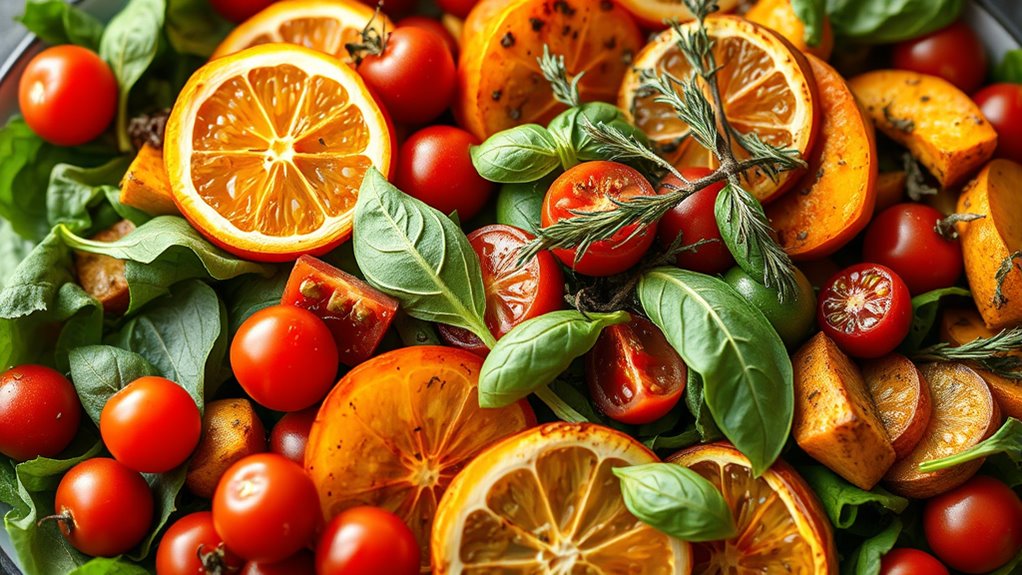Holistic nutrition sees food as medicine, emphasizing its role in supporting your body’s natural healing and resilience. By choosing nutrient-dense superfoods like berries, leafy greens, and seeds, you boost your immune system, reduce inflammation, and promote overall well-being. Herbal remedies like turmeric and chamomile further enhance your health naturally. Incorporating these foods and herbs into your routine fosters long-term health and balance. Keep exploring how these elements can transform your approach to wellness and vigor.
Key Takeaways
- Holistic nutrition emphasizes the interconnectedness of mind, body, and environment, viewing food as a tool for healing.
- Incorporating nutrient-dense superfoods and herbal remedies supports immune health and reduces inflammation naturally.
- Food choices are guided by their impact on body systems, promoting resilience and long-term wellness.
- Herbs like turmeric and chamomile serve as natural medicines, enhancing health without pharmaceuticals.
- Small daily dietary adjustments foster sustainable, balanced lifestyles that empower natural healing and overall well-being.

Have you ever wondered how your overall well-being depends on more than just the food you eat? It’s easy to overlook how certain foods and natural remedies can profoundly influence your health. That’s where holistic nutrition comes in, emphasizing the connection between mind, body, and environment. When you incorporate superfood benefits into your diet, you’re not just eating for sustenance — you’re enhancing your immune system, boosting energy, and promoting mental clarity. Superfoods like berries, leafy greens, and seeds are packed with antioxidants, vitamins, and minerals that work synergistically to protect your cells from damage and support overall vigor. These nutrient-dense foods help reduce inflammation and can even improve your mood, showing that what you eat directly impacts how you feel.
Nourish your mind and body with superfoods that boost energy, immunity, and mental clarity for overall well-being.
Beyond superfoods, herbal remedies serve as powerful allies in your health journey. Using herbs like turmeric, ginger, and chamomile, you can naturally address common ailments and improve wellness without relying solely on pharmaceuticals. Herbal remedies have been used for centuries, offering therapeutic benefits that complement a balanced diet. For example, turmeric’s anti-inflammatory properties can help soothe joint pain, while chamomile promotes relaxation and better sleep. Incorporating these herbs into your daily routine isn’t complicated — from teas to seasonings, they add flavor and healing properties simultaneously. These natural solutions highlight the importance of viewing food as medicine, emphasizing prevention and balance rather than just treatment after illness occurs.
Understanding the benefits of superfoods and herbal remedies also encourages you to think more holistically about your health. Instead of focusing only on calories or macronutrients, you become more mindful of how different foods influence your body’s systems. You start seeing your plate as a tool for healing, resilience, and long-term wellness. This perspective shifts your mindset from quick fixes to sustainable habits, fostering a deeper connection with what you consume. Incorporating a variety of nutrient-rich foods can also improve your immune system, helping your body to better defend against illnesses. When you choose foods rich in superfood benefits and integrate herbal remedies into your lifestyle, you empower yourself to take control of your health naturally.
Ultimately, holistic nutrition reminds you that food isn’t just fuel — it’s medicine. By making mindful choices about what you eat and exploring herbal remedies, you can support your body’s innate ability to heal and thrive. This approach nurtures not only your physical health but also your mental and emotional well-being. Remember, small daily changes can lead to significant long-term benefits, helping you feel balanced, energized, and resilient every day.
Top picks for "holistic nutrition food"
Open Amazon search results for this keyword.
As an affiliate, we earn on qualifying purchases.
Frequently Asked Questions
How Does Holistic Nutrition Address Mental Health Challenges?
Holistic nutrition addresses your mental health challenges by strengthening the mind-body connection and enhancing emotional well-being. You can do this by choosing nutrient-dense foods that support brain health, balance blood sugar levels, and reduce inflammation. When you nourish your body properly, you often experience improved mood, reduced anxiety, and greater resilience to stress. This approach encourages you to view food as an essential tool for mental clarity and emotional stability.
Can Holistic Approaches Replace Conventional Medical Treatments?
Holistic approaches can complement conventional treatments but shouldn’t fully substitute them. You might incorporate detox diets and herbal remedies to support your health, yet it’s essential to consult healthcare professionals. These methods can boost overall well-being and address underlying issues, but they work best alongside standard medical care. Always prioritize professional guidance to ensure safe, effective treatment, especially for serious conditions.
Which Foods Specifically Boost Immune System Function?
Think of your immune system like a fortress, strengthened by antioxidant-rich foods and immune-boosting herbs. Include berries, citrus fruits, and leafy greens, which are packed with antioxidants that fight off free radicals. Add garlic, ginger, and echinacea for their immune-enhancing properties. Incorporating these into your diet helps keep your defenses strong, making it easier for your body to ward off illnesses naturally.
How Personalized Should a Holistic Nutrition Plan Be?
You should aim for a highly personalized holistic nutrition plan, tailoring it to your unique needs. The personalization depth varies based on your health goals, lifestyle, and dietary preferences, ensuring dietary customization that fits you perfectly. By focusing on what works best for your body, you optimize benefits and support overall wellness. This approach helps you stay motivated and achieve sustainable health improvements, making your journey more effective and enjoyable.
What Are Common Misconceptions About Holistic Nutrition?
Holistic healing isn’t a magic wand, yet many believe it’s a cure-all. Common misconceptions about holistic nutrition include the idea that it’s solely about superfoods or restrictive diets. Folks often fall for dietary myths that all processed foods are evil or that supplements can replace whole foods. In reality, holistic nutrition emphasizes balance, personalized care, and understanding how food supports overall well-being, not quick fixes or extreme restrictions.
Conclusion
Embracing holistic nutrition means you become the captain of your health ship, steering clear of quick fixes and embracing food as medicine. Remember, this isn’t just a trend from the Roaring Twenties; it’s a timeless approach to nurturing your body and soul. By making mindful choices, you’ll feel more vibrant and balanced—like a well-tuned vintage car ready to conquer new adventures. So, trust the process, and let food be your ultimate healer on this journey.









